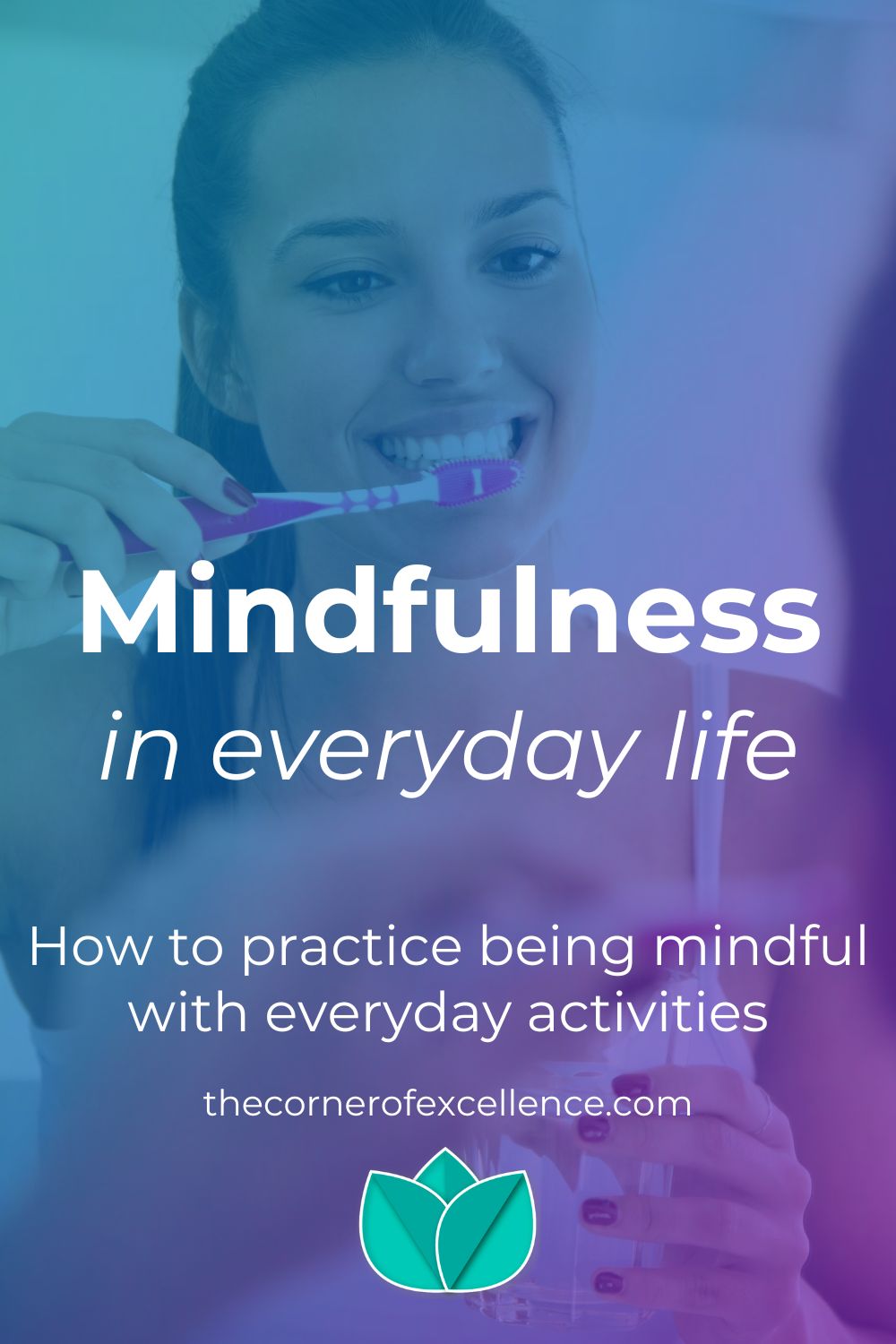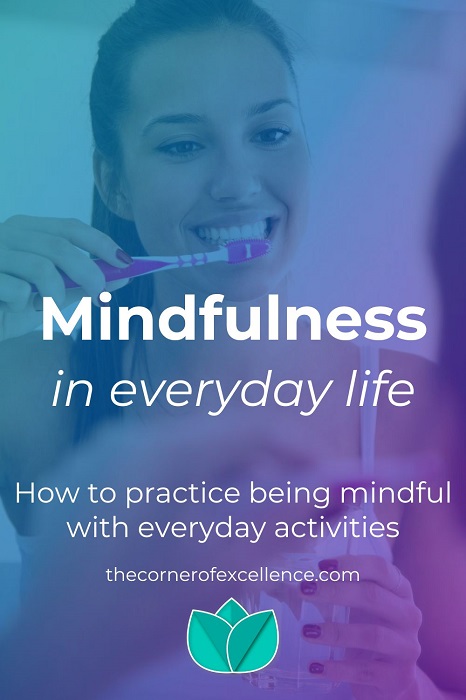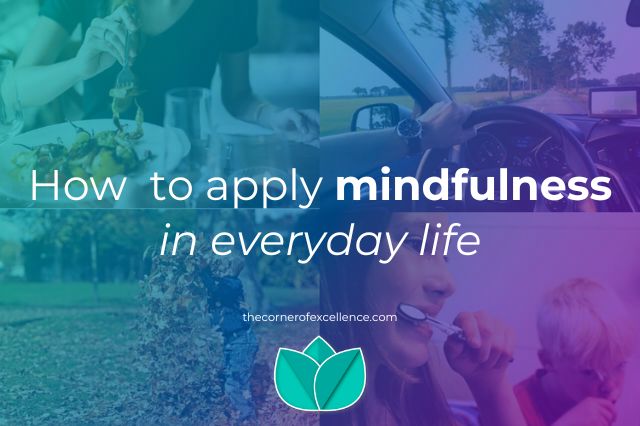
Mindfulness can be in every detail, each thing we do and experience. The thing is that we decide to be attentive and aware and look for peace of mind. Let us see how to use mindfulness in everyday life.
Are you present in what you are doing?
When you get up in the morning, are you getting up or is your mind already in the shower, with breakfast or even work? When you have breakfast, do you pay attention to the food you are eating or do you have an eye on the TV or the newspaper, think about what you have to do today or brood over some worry? While you drive, do you pay attention to the traffic and the act of driving or are you fiddling with the radio or mobile phone? When you talk to somebody, do you pay attention to what he or she is saying or are you impatient to share your opinion?
I could continue enumerating examples. As you can see there are many opportunities along the day to be more present and mindful. But often, more or less consciously, we are brooding over worries and chores that have nothing to do with what we are doing in that moment.
Sometimes we are present without effort
However, we do not always have a hard time being present. Concentrate on preparing a report or presentation, without getting distracted, and feeling productive. Bury oneself in a book. Listen with fascination to what somebody tells us or a talk in a conference.
Perhaps we know how to be mindful when we like something? So it might be a matter of giving more importance to everyday things we do almost automatically. Do with more enthusiasm what we consider a mere formality or obligation. Remove resistance towards things we dislike but need to do.
Mindfulness is acceptance
Mindfulness does not only consist of becoming aware of the present moment but also accepting what is happening, what we are thinking, feeling and experiencing. This does not mean not to act when we can improve our situation; but do so with presence and acceptance instead of resistance, fear or burden of the past.
Eckhart Tolle suggests in his book “The Power of Now” that our ego creates that resistance. According to him, our ego is defined by our past and our fears. Worries, tensions, stress, concern and anxiety are caused by our mind brooding over a possible future. Feelings of sadness, resentment, sorrow, bitterness and guilt are a reflection of not having forgiven and accepted our past. So, the ego feeds on what Eckhart Tolle calls “psychological time” created by past memories and future projections. The ego defines itself by memories, what we were, what we did, what we want to be or fear over what could happen in the future.
However, we only exist here and now. We live in the present moment and it is now when we can act. If our mind gets lost in thoughts about what has been or what could be, we will miss the opportunity of realising that we are alive and complete right now. It is not easy to accept this point because our mind will say “yes, but…”. But right this “yes, but” is due to our ego making value judgments of our life situation. It pushes us to demand ourselves to be different, to aspire to something else, and it resists itself to what is.
Act with presence and acceptance
It is not about resigning ourselves to a life situation we consider improvable; but about accepting that we can only life our life right now, neither in the future nor in the past. That we can only improve our situation if we do it with acceptance instead of fear. If we act from the ego’s insecurities we will repeat the same patterns learned, have they worked or not.
However, if we act with presence, we will be more aware of the situation we are in right now and the opportunities and alternatives for action. Make plans to improve your life situation. Then return to the present and think what you can do at the precise moment. Not tomorrow, not in an hour.
Maybe it is only a matter of accepting that you are alive. Accepting that, be your life situation whatever it is, that it is what it is. Appreciate all you are and have. Perhaps accept that you feel sad about something that has happened in the past but that it is part of the life cycle. Remember that the ego labels things as good or bad. The resistance to accept what is, is what causes us sorrow or worry.
How to practice mindfulness in everyday life
In order to become more aware of the things you take for granted or do almost automatically, I suggest you try the following activities and behaviours:
In the morning
- Brush your teeth paying attention to the movement of the toothbrush and the feeling of the brush and toothpaste in your mouth, on your teeth and gum. A good trick to concentrate better is to brush your teeth with the hand you would not usually use. So, use the left hand if you are right-handed or the right one if you are left-handed.
- When showering, focus on your body, your movements when washing yourself, the feeling of the water running down your body.
- On your way to work, standing at a traffic light, pay attention to what surrounds you: sky, sun, clouds, wind, trees, buildings, cars, other people etc. Also, become aware of your body: the feeling of your hands on the steering wheel, your bottom on the seat, your feet on the ground.
- When walking to the office, in addition to what surrounds you, also pay attention to the movement of your body and the feeling of your feet touching the ground.
Throughout the day
- When feeling annoyed with something or somebody (somebody jumping the queue, a driver blowing the horn, a noisy group on the bus, the noise from a construction site) catch yourself in your negative thoughts. Consider if you can do anything to change the situation or it is a matter of attitude. Accept the situation.
- During breakfast, lunch or dinner pay attention to the smell, look, texture and taste of the food.
- When speaking to somebody try to be present and attentive to what he or she says both verbally and non-verbally. Become aware when you get lost in your thoughts and are preparing your answer instead of listening attentively.
- If worries or things to do are on your mind, write the down to clear your head. Then focus on one thing you want to do. Concentrate on this task and put aside thoughts about other things you should or would like to do.
- Become aware of repetitive thoughts. If they are tasks or errands, note them down. If they are worries, think how you can solve them. Can you do something about it or are you resisting yourself to what it is and to accepting the situation?
- If you need to think about something, take specifically and consciously time for it.
- Next time you go for a walk, pay attention to your surroundings and the nature.
Learn from children
- Watch a baby or small child and how they live the present. When they feel hungry they want to eat. When they play, they immerse themselves in the game. They do not brood over what they will eat later or when they should go to bed. When they fall during the play, they might hurt and even cry. But if we let them get back to play they forget immediately. As they grow up we educate them to worry about the future or resist to accepting the past. But they are not born with this mindset.
Do want to know more about specific exercises? You may find mindfulness exercises here and more exercises for mindfulness here.
Conclusion
As you can see there are many opportunities to stop living on autopilot. To pay more attention to the here and now. Remember that anxiety is due to future projections and demands we impose on ourselves. A feeling of sorrow or guilt is caused by not having forgiven and accepted things belonging to the past.
However, you can free yourself from this load if you realise that life is this instant and that you can decide how to experience it.

Sharing is caring!




